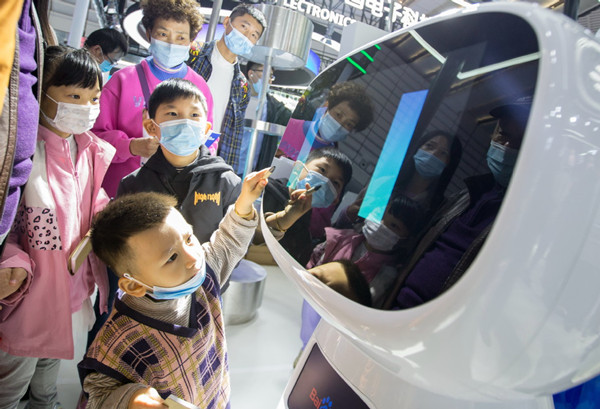Baidu's Li makes a case for using emerging tech to sustain innovation

Children interact with a Baidu robot during an expo in Wuzhen, Zhejiang province. [Photo by Zhai Huiyong/For China Daily]
China should speed up the commercialization of autonomous vehicles and deploy smart transport systems using emerging technologies such as artificial intelligence and 5G, Chinese internet tycoon Robin Li said on Wednesday.
"Low-carbon transport, accelerated commercialization of autonomous driving and the use of tech-enabled smart transport will ease traffic congestion, provide convenient and environmentally-friendly travel options and achieve the carbon dioxide emission targets," said Li, chairman and CEO of internet search giant Baidu Inc.
Li, who is also a member of the 13th National Committee of the Chinese People's Political Consultative Conference, said the government must boost policy innovation, establish a large-scale commercial promotion mechanism for autonomous driving with the participation of governments at all levels, enterprises, universities and research institutes, and encourage research and development, and innovation in the autonomous driving sector.
Baidu has already made a name for itself in AI after years of heavy investment in technologies like smart cloud and autonomous driving. During the fourth quarter of the last fiscal year, Baidu spent 5.7 billion yuan ($881 million) on research and development, up 19 percent on a yearly basis.
Stressing the importance of developing the smart economy and accelerating the development of AI will be the main focal points for Li at the upcoming two sessions. He plans to submit five proposals during the sessions, with three of them dealing with AI.
Emerging technologies are gradually playing a vital role in China's high-quality development due to the advantages and high efficiency that innovation can bring to the entire society. The central government has reiterated that it would give priority to strategic technologies such as AI in the 14th Five-Year Plan (2021-25).
According to a new report released by the China Center for Information Industry Development, AI will provide underlying support for the development of the smart economy and industrial digitalization, promoting deeper integration of AI and fields such as 5G, cloud computing and the internet of things.
During the first six months of last year, the total scale of China's core AI industries reached 77 billion yuan, with the number of AI companies exceeding 260, making the country a major hub for AI unicorns, said the report citing official data.
Li said AI-powered smart elderly care services must be promoted across the nation as the country's population is aging rapidly.
"Around 90 percent of China's seniors live and receive care at home, while 7 percent stay at community-based centers and 3 percent at nursing homes. However, only a very small part of urban community can afford elderly care services. Considering that there are insufficient human resources for community-based elderly care, deployment of smart speakers and other similar smart devices will help make the lives of elderly people much more easier."
He suggested promoting elderly care technologies and applications including health management equipment, accelerating the construction of a comprehensive management information service platform for the elderly for medical care at home, emergency calls and other services.
According to Li, more efforts are also needed to build a multilevel education system to meet the increasing demand for AI talents, promote the free flow of information and data between different internet platforms, strengthen data sharing regulations and offer cybersecurity training for students.
Copyright © The National Committee of the Chinese People's Political Consultative Conference.
All rights reserved. Presented by China Daily.
京ICP备08100501号-1

